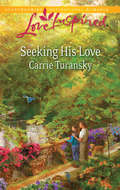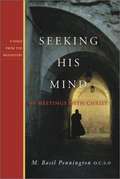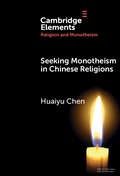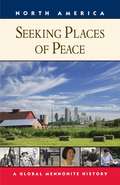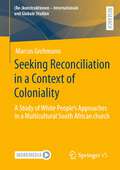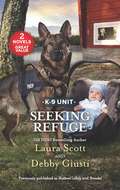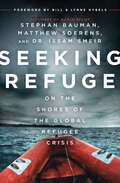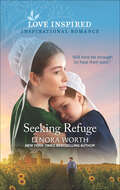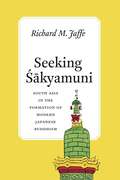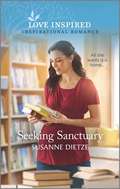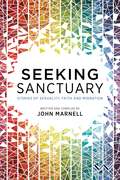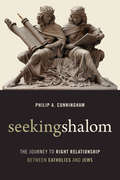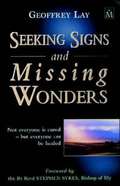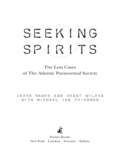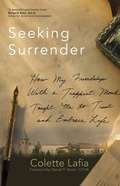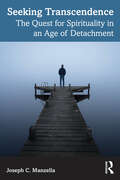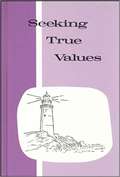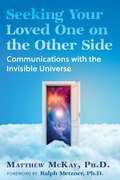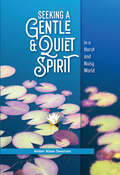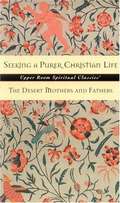- Table View
- List View
Seeking His Love
by Carrie TuranskySince losing his wife and child, widower Cam McKenna has tried to avoid children. But when he must temporarily care for his niece, Cam opens his home. With no idea how to relate to a fourteen-year-old girl, he seeks the advice of the new Christian Youth theater director. He's touched when Rachel Clark gives his niece a scholarship-and teaches him a thing or two about teens...and love. But why is Rachel so secretive about her past? The truth threatens their fragile relationship yet promises to bring them closer to each other-and the Lord- than either dreamed possible.
Seeking His Mind: 40 Meetings With Christ
by M. Basil PenningtonThe abbot and best-selling author of Centering Prayer explains the Christian method of transformation known as lectio, which enables the believer to enter fully and reverently into communion with God by hearing and meditating on His Word.
Seeking Justice
by Sharee StoverAn agent and her K-9 partner risk their lives in the ultimate mission With her partner gravely injured in the line of duty, FBI agent Tiandra Daugherty has one shot to complete her mission. She&’ll have to convince her partner&’s twin brother, Officer Elijah Kenyon, to take his place undercover in a deadly drug ring. Together they must find justice for his brother and dismantle the gang. But the target is now on them, and the mission could prove fatal.From Love Inspired Suspense: Courage. Danger. Faith.
Seeking Monotheism in Chinese Religions (Elements in Religion and Monotheism)
by Huaiyu ChenIn the nineteenth and early twentieth centuries, numerous Western missionaries were involved in debating the existence of God in various religious texts and practices in ancient China. Drawing on both the rising philological scholarship in Europe and their own field experience in China, the Western missionaries examined the idea of God, the Thearch, and Heaven as the Supreme Being in the spiritual life and ritual activities of the Chinese people. From the Christian perspective, they attempted to identify the original belief in one God in ancient China in order to convert their Chinese audience. Furthermore, they addressed the issue of monotheism in the broader Asian context by suggesting the universal monotheistic degeneration from Persia to China across Asia continent.
Seeking Mr. Perfect
by Yvonne LehmanLizzie Marshall is giving up on dating Then Mr. Perfect walks into her life. Her mystery man is the one she's been waiting for-except that he's dressed as a clergyman! Outspoken Lizzie wouldn't make a good pastor's wife, so it's for the best that she's no longer looking for a husband. When Lizzie mistakes him for a clergyman, Zach Grant plays along, if only to get close to the sweet beauty who has sworn off men. Though Zach has business reasons for wanting to know her better, soon his feelings for Lizzie become all too personal. But will his deception keep her from giving love one last chance?
Seeking Places of Peace: A Global Mennonite History (Global Mennonite History Ser.)
by Royden LoewenPerhaps the most inclusive, sweeping, and insightful history ever written about the North American Mennonite saga. Both authors are eminent historians. Royden Loewen is Professor of History, with a chair in Mennonite Studies, at the University of Winnipeg. Steven M. Nolt is Professor of History at Goshen (IN) College. Both authors of this book bring to the task the insights of "social history." As such, they focus on people in many geographical environments rather than on institutional development and theological controversy. Readable, understandable, and incisive. Appeals to all ages and all groups.
Seeking Reconciliation in a Context of Coloniality: A Study of White People’s Approaches in a Multicultural South African church ((Re-)konstruktionen - Internationale und Globale Studien)
by Marcus GrohmannHow do white people handle their own dominance while striving for racial reconciliation in a concrete church context in Cape Town? Persisting effects of colonialism present a challenge to reconciliation efforts in settler-colonial societies. This book draws particular attention to the coloniality of knowledge in multicultural churches and denominations. Despite its ability to connect, English is here regarded as an obstacle to deeper cross-cultural understanding and appreciation. The findings of this ethnographic study reveal how – motivated by a ‘Hope for transformation from within’ – racial integration often took precedence over equity. Eurocentric leanings were found to be both acknowledged and downplayed. With the emphasis on inclusion and upliftment, the equally sought-after cultural diversity was limited by the inadvertent setting up of boundaries, particularly regarding language and theology. Grohmann concludes that the perceptible but not prominent mode of choosing vulnerability, i.e. relating on other people’s terms, constitutes a promising alternative to conventional ways of tackling inequalities. This decolonial approach to reconciliation would have the potential to advance both equity and equality.
Seeking Refuge
by Debby Giusti Laura ScottThese officers solve the toughest cases with the help of their brave canine partnersShattered Lullaby by Laura ScottOverhearing the murder of her sister, Lacy Germaine grabs her baby nephew and flees. But not before she’s seen by the killer—who she’s certain is her lawman brother-in-law. Now an instant mom on the run, Lacy refuses to trust anyone, including her rescuer, K-9 cop Matt Callahan. Keeping the beautiful woman and vulnerable baby safe soon becomes Matt’s top priority. But no matter how deep they hide, danger finds them.Stranded by Debby GiustiColleen Brennan has one goal—take down her sister’s killer. But chasing after evidence leaves her in the path of a tornado and stranded in an Amish community. With the killer nearby, Colleen must depend on Special Agent Frank Gallagher. Although Frank is recuperating from a battlefield injury, he wants to help Colleen. But he can tell she’s hiding something…
Seeking Refuge: On the Shores of the Global Refugee Crisis
by Stephan Bauman Matthew Soerens Dr. Issam SmeirRecipient of Christianity Today's Award of Merit in Politics and Public Life, 2016------What will rule our hearts: fear or compassion?We can&’t ignore the refugee crisis—arguably the greatest geo-political issue of our time—but how do we even begin to respond to something so massive and complex?In Seeking Refuge, three experts from World Relief, a global organization serving refugees, offer a practical, well-rounded, well-researched guide to the issue.Who are refugees and other displaced peoples?What are the real risks and benefits of receiving them?How do we balance compassion and security?Drawing from history, public policy, psychology, many personal stories, and their own unique Christian worldview, the authors offer a nuanced and compelling portrayal of the plight of refugees and the extraordinary opportunity we have to love our neighbors as ourselves.
Seeking Refuge: On the Shores of the Global Refugee Crisis
by Stephan Bauman Matthew Soerens Dr. Issam SmeirRecipient of Christianity Today's Award of Merit in Politics and Public Life, 2016------What will rule our hearts: fear or compassion?We can&’t ignore the refugee crisis—arguably the greatest geo-political issue of our time—but how do we even begin to respond to something so massive and complex?In Seeking Refuge, three experts from World Relief, a global organization serving refugees, offer a practical, well-rounded, well-researched guide to the issue.Who are refugees and other displaced peoples?What are the real risks and benefits of receiving them?How do we balance compassion and security?Drawing from history, public policy, psychology, many personal stories, and their own unique Christian worldview, the authors offer a nuanced and compelling portrayal of the plight of refugees and the extraordinary opportunity we have to love our neighbors as ourselves.
Seeking Refuge: Seeking Refuge (Amish Seasons #3)
by Lenora WorthWill love be enough to heal their past?Her secret kept them apart…Will courage give them another chance?Days before her wedding, a wrenching ordeal shattered Josie Fisher’s dreams…and she fled to her Amish hometown to start over. Now Tobias Mast has arrived with two goals: to find Josie and learn why she called off their wedding, and to buy a home. When the only house he can afford is next door to Josie’s farm, will she finally risk telling him her dark secret?USA TODAY Bestselling Author
Seeking Sakyamuni: South Asia in the Formation of Modern Japanese Buddhism (Buddhism and Modernity)
by Richard M. JaffeThough fascinated with the land of their tradition’s birth, virtually no Japanese Buddhists visited the Indian subcontinent before the nineteenth century. In the richly illustrated Seeking Śākyamuni, Richard M. Jaffe reveals the experiences of the first Japanese Buddhists who traveled to South Asia in search of Buddhist knowledge beginning in 1873. Analyzing the impact of these voyages on Japanese conceptions of Buddhism, he argues that South Asia developed into a pivotal nexus for the development of twentieth-century Japanese Buddhism. Jaffe shows that Japan’s growing economic ties to the subcontinent following World War I fostered even more Japanese pilgrimage and study at Buddhism’s foundational sites. Tracking the Japanese travelers who returned home, as well as South Asians who visited Japan, Jaffe describes how the resulting flows of knowledge, personal connections, linguistic expertise, and material artifacts of South and Southeast Asian Buddhism instantiated the growing popular consciousness of Buddhism as a pan-Asian tradition—in the heart of Japan.
Seeking Sanctuary (Widow's Peak Creek #2)
by Susanne DietzeAll she wants is a home…Can her second chancesurvive a painful secret?When pregnant single mom Paige Faraday arrives in Kellan Lambert’s bookstore seeking a temporary job, he wouldn’t dare turn away the sister of his old military buddy. After all, she just needs the job until her baby’s born and she figures out her next steps. But when Kellan’s deepest secret threatens their growing bond, will Paige be able to forgive him for the past he can’t forget?From Harlequin Love Inspired: Uplifting stories of faith, forgiveness and hope.Widow’s Peak Creek
Seeking Sanctuary: Stories of Sexuality, Faith and Migration
by John MarnellA glimpse into the lives of LGBTQ migrants in Johannesburg, in their own words Seeking Sanctuary brings together poignant life stories from fourteen lesbian, gay, bisexual and transgender (LGBT) migrants, refugees and asylum seekers living in Johannesburg, South Africa. The stories, diverse in scope, chronicle each narrator’s arduous journey to South Africa, and their corresponding movement towards self-love and self-acceptance. The narrators reveal their personal battles to reconcile their faith with their sexuality and gender identity, often in the face of violent persecution, and how they have carved out spaces of hope and belonging in their new home country. In these intimate testimonies, the narrators’ resilience in the midst of uncertain futures reveal the myriad ways in which LGBT Africans push back against unjust and unequal systems.Seeking Sanctuary makes a critical intervention by showing the complex interplay between homophobia and xenophobia in South Africa, and of the state of sexual orientation and gender identity (SOGI) rights in Africa. By shedding light on the fraught connections between sexuality, faith and migration, this ground-breaking project also provides a model for religious communities who are working towards justice, diversity and inclusion.
Seeking Shalom: The Journey to Right Relationship between Catholics and Jews
by Philip A. CunninghamThe amazing, historic journey of Jews and Christians coming together. In this book Philip Cunningham traces the remarkable developments in Catholic-Jewish relations over the last fifty years. Centuries of antipathy and suspicion, Cunningham says, have largely given way to a new, mutually enriching relationship between the two traditions of Judaism and Catholicism. A specialist in Christian-Jewish relations, Cunningham recounts the amazing, historic journey of Jews and Christians coming together in light of both Scripture and theology, covering the period from Vatican II up to the present day. After fifty years of significant dialogue, Cunningham suggests, Catholics and Jews are now on the threshold of building true shalom between their two communities, experiencing the Holy One anew in each other's distinctive and edifying ways of walking with God.
Seeking Shalom: The Journey to Right Relationship between Catholics and Jews
by Philip A. CunninghamThe amazing, historic journey of Jews and Christians coming together. In this book Philip Cunningham traces the remarkable developments in Catholic-Jewish relations over the last fifty years. Centuries of antipathy and suspicion, Cunningham says, have largely given way to a new, mutually enriching relationship between the two traditions of Judaism and Catholicism. A specialist in Christian-Jewish relations, Cunningham recounts the amazing, historic journey of Jews and Christians coming together in light of both Scripture and theology, covering the period from Vatican II up to the present day. After fifty years of significant dialogue, Cunningham suggests, Catholics and Jews are now on the threshold of building true shalom between their two communities, experiencing the Holy One anew in each other's distinctive and edifying ways of walking with God.
Seeking Signs and Missing Wonders
by Geoffrey LayJeoffrey Lay went blind, through a genetic defect, in his late twenties, and his wife Christine lost a daughter at the age of five months from serious cerebral palsy and other disabilities. Geoff is not only a Christian but a parish priest with a healing ministry.
Seeking Spirits
by Michael Jan Friedman Jason Hawes Grant WilsonTV's POPULAR GHOST HUNTERS REVEAL ALL-NEW, NEVER-BEFORE-TOLD STORIES FROM THEIR SPOOKY EARLY INVESTIGATIONS! For the first time ever, Jason Hawes and Grant Wilson, founders of The Atlantic Paranormal Society (T.A.P.S.), share their most memorable and spine-tingling early cases -- none of which has ever appeared on television. Beginning with the previously untold experiences that sparked their passion for ghost hunting, Jason and Grant's bone-chilling investigations uncover: A Connecticut woman who seems to exist in two places at once A little girl whose invisible playmate retaliates against her father's punishments A man overcome by an evil entity as Jason and Grant survey his home A distraught woman who dreams of paranormal events before she experiences them...and much more! Jason and Grant didn't always have the fancy scientific equipment and experienced team that fans now watch on their smash-hit television show. As they share their hair-raising first experiences, they offer essential tips for budding paranormal investigators -- including how to use an electromagnetic field (EMF) meter and an infrared camera, determine if a supernatural phenomenon is good or evil, and deal with spirits. Whether you're a skeptic or a believer, these fascinating and frightening true stories will keep you up at night!
Seeking Surrender: How My Friendship with a Trappist Monk Taught Me to Trust and Embrace Life
by Colette Lafia Daniel P. Horan O. F. M.An unlikely friendship between Colette Lafia and a silent monk at the Abbey of Gethsemani, where Thomas Merton lived, comes to life through seven years of shared letters. Lafia's palpable openness and warm storytelling lead readers through the same compassionate process that led the author to accept herself, find peace with life, and strive for an ever-deepening relationship with God. Folded within the deep friendship cultivated through letters exchanged between Colette Lafia, a spiritual director and retreat leader, and Brother Rene, a Trappist monk, is Lafia's struggle with infertility, insomnia, the loss of her sister, the declining health and eventual death of her father, and her role as caregiver. Brother Rene's compassion and guidance throughout these trials--and Lafia's responses--provide a template for helping readers to surrender to God in their own struggles. Readers will find simple exercises and profound advice for living a more conscious and intentional life, with tips such as, "look at yourself through God's eyes," "notice when fear arrives at your door," and "trust all is well. " Readers will ultimately discover a new attitude of acceptance and letting go.
Seeking Transcendence: The Quest for Spirituality in an Age of Detachment
by Joseph C. ManzellaSeeking Transcendence examines the various paths taken by those who have detached themselves from their traditional, institutional religious roots but are seeking non-traditional paths to spiritual experiences. Called the “nones” or "non-affiliated" in popular mass media, these include a significant number of Western folks who maintain a belief in God or at least consider themselves “spiritual but not religious”.Each chapter of the book explores these trends with a specific theme, as well as a case study based on the author’s ethnographic observation of alternative spiritual communities and practices in North America and Western Europe.Ultimately, this book shows how contemporary alternatives to traditional institutional religion appeal to nones, presenting the relevance of new religious movements and more secular spiritual paths to transcendence.
Seeking True Values: Workbook
by Velina HooverThe Day We Lost The Game, The Return of the Dove, The Gutenberg's' Secret Coaly Bay, Outlaw Horse, Charity, Who Hath a Book, Benjamin’s Message, Trek Across The Mountains and The Bible.
Seeking Your Loved One on the Other Side: Communications with the Invisible Universe
by Matthew McKay• Shares a proven process that has worked for the author as well as thousands of others to communicate with deceased loved ones• Explores the use of mediums, past-life and between-life hypnotic regressions, a technique called Induced After-Death Communication, and channeled writing• Presents revelations about the soul&’s life after death, the structure of the afterlife, how karma works, and how to love in the face of painIf you&’ve lost a loved one or had a brush with mortality, you undoubtedly have wondered about life after death—or if it&’s possible to connect with souls on the other side. After the tragic death of his son, Jordan, the author embarked on a journey for ways to communicate with his son across the veil. He discovered not only successful methods to connect with lost loved ones but also profound truths about the afterlife, the illusion of loss, and how pain is integral to our life purpose.McKay recounts techniques he tried in order to connect with his son, including collecting unusual experiences from family and friends, consulting mediums such as Austyn Wells, undergoing past-life and between-life regressions, engaging in a technique called Induced After-Death Communication, and using channeled writing, which he learned with the help of psychologist Ralph Metzner.The culmination of hundreds of channeled conversations with his son, the author presents revelations about the soul&’s life after death, the structure and key events of the afterlife, how karma works, why we incarnate, our future as souls, and how to love in the face of pain. As Jordan reveals, nothing is truly lost. The soul is constant and, while pain seems to damage us, the damage is an illusion. Because, as Jordan says, &“there is no end; the conversation goes on . . . between all the souls who love each other, living and dead.&”
Seeking a Gentle and Quiet Spirit in a Harsh and Noisy World
by Amber Albee SwensonHow is a God-fearing woman supposed to navigate the land mines of modern culture? Is it really possible to have a \u201cgentle and quiet spirit\u201d in a world that values individuality and outspokenness to a fault? It\u2019s no secret that women face unique pressures and demands from our noisy, fast-paced society. Compelled to look good 24/7 by relentless advertising and social media feeds. Pushed to compete in a postfeminist, dog-eat-dog corporate world—and judged if they choose a different path. Expected to follow certain fashion trends or think specific things both culturally and politically. If you\u2019re sick of the world\u2019s pressures and pace but also afraid gentle and quiet are not words that describe you, there is still hope! Seeking a Gentle & Quiet Spirit in a Harsh and Noisy World was written for you by a woman who u
Seeking a Purer Christian Life: Sayings and Stories of the Desert Fathers and Mothers
by Keith Beasley-TopliffeThis is a collection of stories and sayings of the desert fathers and mothers, the deserts of Egypt and Syria. About 80 pages.
